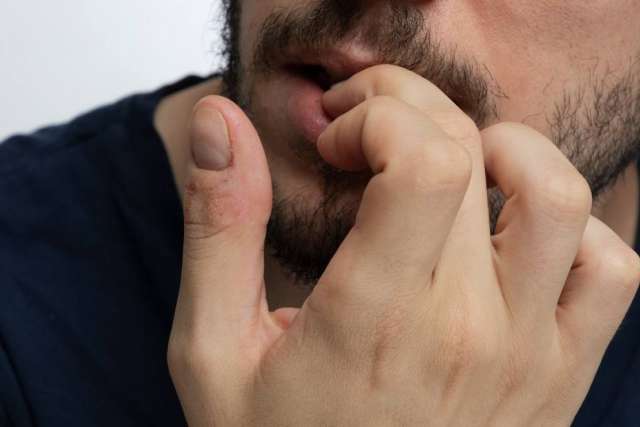The good news is that quitting is possible for most people. Here’s what you need to know to get started on stopping your nail-biting habit:
Why people bite their nails
Most people begin biting their nails during childhood, after age 3 or 4. Many children outgrow a nail-biting habit. But some children who have a habit of sucking their thumb or fingers may later adopt nail biting in its place. Nail biting can also begin during adolescence or adulthood — though a sudden nail-biting habit can also be a side effect of medication.
No matter when the habit forms, it often begins as a coping mechanism in response to feeling nervous, bored, lonely or hungry. But it’s also commonly associated with emotional or psychological problems, including:
- Anxiety
- Attention-deficit/hyperactivity disorder (ADHD)
- Enuresis, or bed-wetting
- Oppositional defiant disorder (ODD)
- Separation anxiety
- Tic disorder
Pathological or severe, uncontrollable nail biting is the most common body-focused repetitive behavior (BFRB). People with a BFRB disorder who bite their nails may also have other body-focused repetitive behaviors such as skin picking and hair pulling. These behavioral disorders are related to obsessive-compulsive disorders, and some people have a genetic tendency toward them.
Why nail biting is bad for you
No matter when or why you start nail biting, the habit can be difficult to break once it forms. And repeatedly biting your nails can cause some short-term issues to develop, including:
- Dental problems such as misalignment and chipped teeth
- Fungal infections in the nail bed
- Illness, as fingers pass bacteria to your mouth
- Mouth issues, including jaw pain and soft tissue injuries
- Skin infections
- Tissue damage to fingers, nails and cuticles
The good news is that long-term damage from nail biting is rare. But it does happen, especially if you swallow the bitten nails. You may also be ingesting bacteria that can lead to stomach or intestinal infection.
When to see a doctor about nail biting
Minor issues with nail biting rarely warrant a visit to the doctor. But you may want to consult your provider if you have recurring:
- Ingrown nails
- Nail discoloration
- Nails that are separating from surrounding skin
- Skin or nail infections
- Swelling, pain or bleeding around your nails
Excessive nail biting may require a more serious treatment regimen that addresses the physical and psychological factors involved. But knowing whether your nail biting is normal or pathological isn’t always easy. Your behavior may be pathological if:
- You can’t stop even after repeated attempts
- Not biting your nails triggers severe distress, such as shame, anxiety or guilt
- Nail biting limits your ability to function
Tips to help you stop biting your nails
Changing any habit can be difficult and takes time. But with the right plan (and some persistence), you may be able to stop biting your nails for good.
Identify your triggers
Pay attention to the times you are most likely to bite your nails. The three most common triggers are situations:
- Anxious or stressed
- Bored or under-stimulated
- Mentally engrossed in a task
Once you identify what’s triggering you, try to find a replacement behavior for nail biting. Consider squeezing a stress ball, playing with a fidget toy or chewing gum.
Try remedies to prevent nail biting
Available products and solutions can spotlight when you’re nail biting and make the behavior less rewarding. Try:
- Keeping nails trimmed to reduce the hangnails and ragged edges that temp you to bite
- Painting nails with bitter-tasting polish
- Using barriers to biting, like gloves or retainer-style devices
Get professional treatment
If you can’t break a nail-biting habit on your own, cognitive behavioral therapy (CBT) and acceptance and commitment therapy (ACT) can help you get to the psychological aspect of your nail biting. Therapy can also be combined with habit-reversal training when necessary.
If you need help with a body-focused repetitive behavior or health issues related to nail biting, reach out to your primary care physician.



